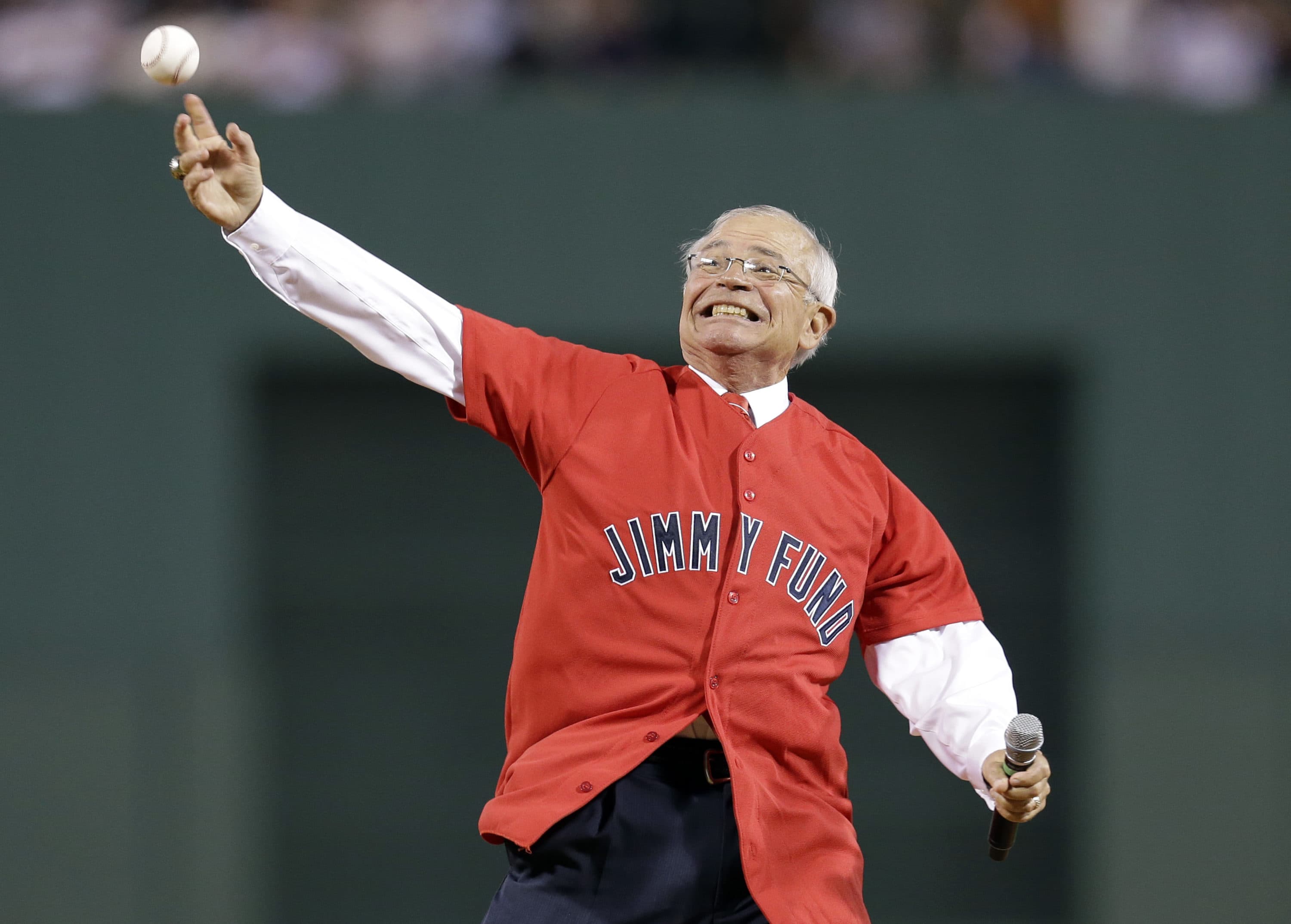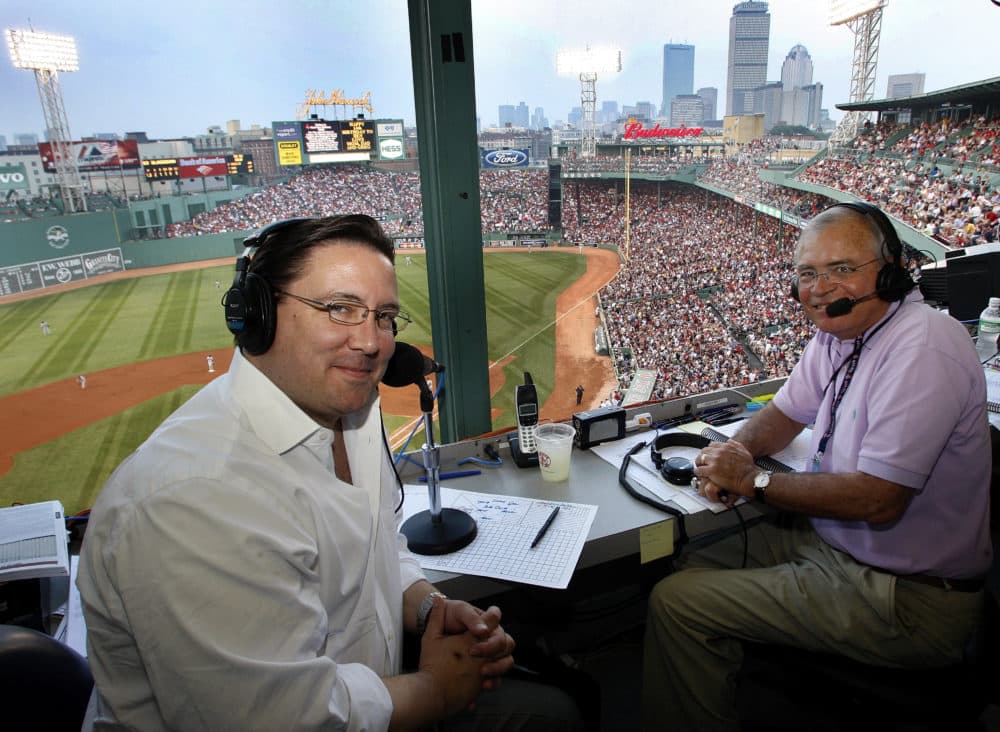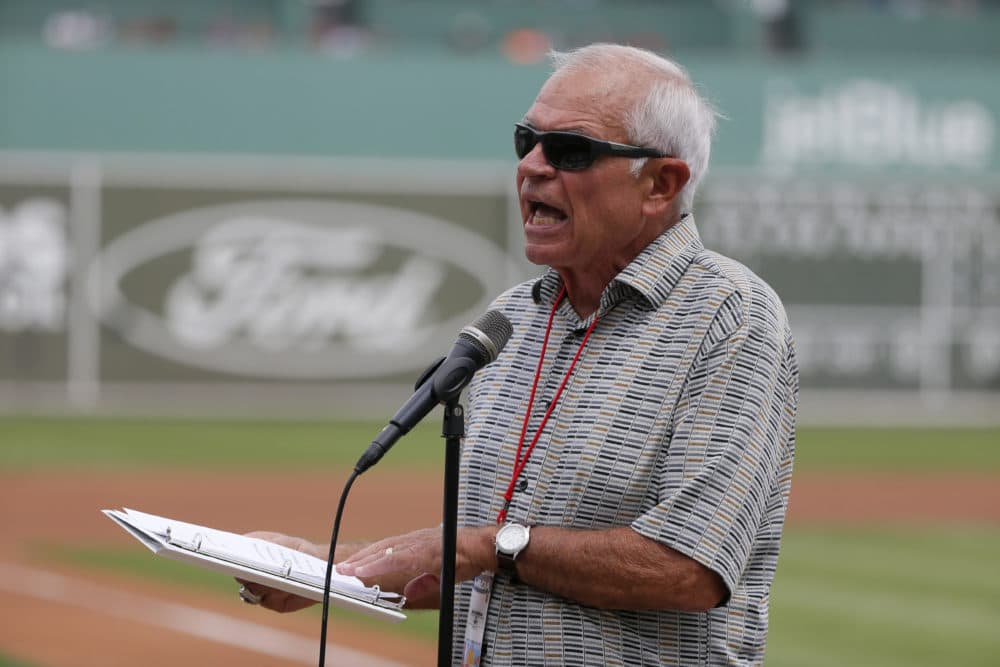Advertisement
'Baseball Is A Radio Game': Joe Castiglione On Being Behind The Mic For The Red Sox Since 1983
Resume
The Boston Red Sox are scheduled to open the regular season this Thursday at Fenway Park. For the first time in over a year, spectators will be in the mix. A few thousand fans are allowed into the ballpark, with pandemic-related safety protocols in place.
In the midst of a disorienting year, one beacon of reassuring familiarity is Joe Castiglione. The Red Sox radio announcer signed on with the team in 1983 and his voice has become part of the emotional fabric of Boston, especially after his exuberant call of the reverse-the-curse 2004 World Series victory — "Can you believe it?"
Shortly before he flew back to Massachusetts from spring training in Florida, Castiglione spoke with WBUR’s Weekend Edition. You could listen to the interview by clicking the play button atop this post, or read an extended version below.
Interview Highlights
On what he’s most looking forward to about calling the game at Fenway in front of a crowd again:
"Hearing that buzz, that real buzz that you hear when the batter for the opposing team grounds into a double play, or a Red Sox player hits one over the Green Monster into Lansdowne Street. Or 'Sweet Caroline' in the middle of the eighth inning, not just the musical version, but with fans singing along. All those types of things — I think that’s what we missed so much since this pandemic began. ... And we are just looking for a return to normalcy. And, of course, for a better team than we had last year, when it didn’t go too well."

On how he hits the sweet spot of providing information and commentary while pausing to let the game breathe:
"Baseball is a radio game. It can be background sound for people, who then all of a sudden turn up their antenna when something big is happening and the announcer's voice rises or the crowd starts to rise in volume. And you can sense that something is happening, because there's really a lot of nothing happening! In a three-hour baseball game, that little sphere that’s five and a quarter ounces is in play no more than eight minutes! So there's a lot of time to fill. It doesn't mean you have to talk every second, because people do like to hear the buzz of the crowd. They like to hear the hot dog vendors, the crack of the bat. It all adds to the ambiance of baseball on the radio. You try to capture that. You try to be descriptive. You can fill in the blanks between pitches. And that's where, you know, storytelling comes in, anecdotes, background information, conversation with your broadcast partners, or letting the natural sounds play."
On calling ball games at difficult moments when people are struggling, such as after 9/11 or the Boston Marathon bombing, or during the pandemic:
"You have to be consistent and look at it as a fan's diversion from some of the hard cold facts of life. And I think we took the approach that we're giving you the ball game, some entertainment to get away from thinking about this pandemic and all of the trials and tribulations of it. Just to get away from it for a while."
On what it means to him to be intertwined with the intense memories of so many people about life between March and, with any luck, October:
"It’s certainly a blessing, and I've been very blessed to be in this position. I think I first realized something along these lines when I was talking at a sports banquet with a long-time Red Sox and Boston Braves fan, a priest named Msgr. John Dillon Day. Msgr. Day pointed out to me that what I am is like a postulant, because I bring joy and light to the elderly and to the shut-ins. And, you know, those people are not reflected in ratings necessarily. They're not the target audience for advertisers. But it's a big part of our audience. And I think of that. And I think that that is a responsibility that we have, and a blessing to be able to bring some joy into the lives of people who may be infirm or elderly, as well as those, you know, who are just great baseball fans and love the game."

On what he would say to someone who wants to follow in his footsteps:
"Well, I think I would say, persevere, believe in yourself, and learn how to prepare. To prepare for a baseball game, we have a regular routine. You know, you read the sporting prints ... the Boston Globe, the Boston Herald, and, of course, whatever you can on the internet. You get to the ballpark, you interview players. But you also prepare [over] a lifetime. And that means by studying baseball — because everything in baseball is predicated on what happened yesterday and the day before and the week before and the month before. The year before. The decade before. Like a pyramid. Most sports don't quite work that way, because rules have changed and the type of athlete has changed. Yes, baseball players are better athletes than they were a generation ago, bigger and stronger. But the game really hasn't changed, other than the designated hitter. The only real rule change was in 1893, when they moved the pitcher's mound back to 60-feet 6-inches. And I think there's so much tradition, that you have to know the history of the game. And that's what I mean by lifetime preparation. The reading you do, even collecting baseball cards and reading the back of the cards! Reading biographies, reading the history of the game. All of those things, I think, are necessary to prepare to be a broadcaster.
Advertisement
"The other key is [to] learn how to be a good storyteller, because you have to fill in between the pitches. And to be a good storyteller — to pick up stories — you have to be a good listener. When I go to the ballpark and I'm on the field, my job is to listen to what people say and then, you know, file it in my brain, or take notes, or whatever, so that I can tell stories to entertain and inform fans. So, being a good listener, and being a good researcher, and having the curiosity, is critical."
On what his walkup music would be, if baseball broadcasters were granted such a flourish:
"Ah, I really never thought about that! Probably it would be something from Motown, my favorite sound. Maybe 'Get Ready,' by the Temptations to get ready for the game. But there have been some moments where 'Tracks of My Tears' would fit! Though we've overcome that with four world championships in 15 years. Red Sox fans, I think, are a lot more relaxed these days."
This segment aired on March 28, 2021.

